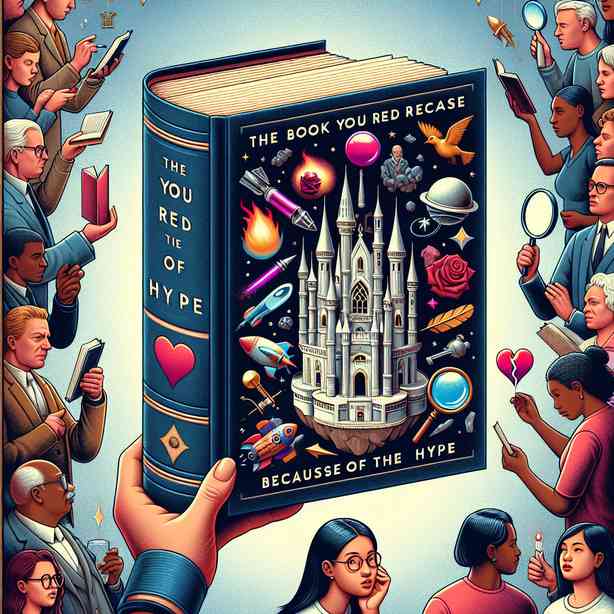
The phenomenon of reading books due to the hype surrounding them has become increasingly common in modern society. With social media, book blogs, and online platforms like Goodreads and BookTok, literary anticipation builds to a fever pitch before a title’s release date. This unfolding trend raises intriguing questions about why we feel compelled to dive into these hyped titles and how they affect our reading choices and experiences.
The concept of “hype” in the literary world often revolves around the idea of social validation. When influential figures or popular platforms endorse a book, it creates a sense of urgency and curiosity among potential readers. Readers often want to be part of the conversation and fear missing out on a cultural moment. This pressure can lead individuals to pick up books they may not have otherwise considered, quite literally stepping outside their comfort zones.
Hyped books also come with a community aspect. Engaging with others who have read the same title can enhance the reading experience. It creates a shared interest, fostering social interactions both online and offline. For example, many readers flock to social media platforms to share their thoughts, emotions, and analyses, enriching the text’s layers through collective discourse. This interconnectedness can amplify enjoyment but also lead to divisive opinions.
However, this social aspect does not come without risks. The sheer volume of hype can set unrealistic expectations. Readers may dive into these books with preconceived notions influenced by marketing strategies or overly enthusiastic reviews. When the anticipated experience doesn’t align with their expectations, disappointment can ensue, leading to harsh critiques or abandonment of the book altogether. This phenomenon presents an important aspect of reading culture, suggesting that hype can sometimes overshadow the intrinsic value of a book.
Additionally, the nature of what becomes hyped can also be problematic. Often, the market for books may gravitate towards certain genres, styles, or themes based on societal trends rather than literary merit. This trend can lead to a narrowing of literary diversity, as unconventional stories or voices may not receive the same platform. Consequently, it’s vital for readers to remain aware of their own reading habits and to seek out diverse narratives, even when those narratives do not come wrapped in the glossy packaging of hype.
As we consider individual motivations for reading hyped books, the role of escapism often comes into play. In a world where everyday life can be overwhelming, people often turn to fiction to provide a temporary escape, and hyped books promise extraordinary journeys. Be it through the lens of fantasy, romance, or gripping thrillers, these books present opportunities to experience lives and worlds dramatically different from our own. This sense of adventure is enticing, leading readers to purchase or borrow these titles in pursuit of an enriching literary experience.
Moreover, reading books propelled into the spotlight can also resonate deeply with current societal issues, providing a framework through which readers can explore and reflect on their realities. Many bestselling novels tackle complex themes like mental health, identity, or social justice, inviting readers to engage critically with these matters. Consequently, reading such books may help foster understanding and empathy, facilitating conversations around significant topics in society.
In combating the effects of hype, readers might consider developing a more discerning approach. Taking time to explore lesser-known works or seeking out recommendations from trusted sources rather than from trending platforms can lead to unexpected treasures. Building a personalized reading list based on individual tastes and preferences rather than external pressures can open up a more genuine connection with literature. This strategy helps sustain a fulfilling reading journey, making time for both hyped novels and hidden gems alike.
Maintaining this balance becomes increasingly important as digital platforms evolve and new forms of hype emerge. As audiences are constantly bombarded with recommendations and trending lists, it can become simpler to participate passively rather than actively curating one’s reading experience. Engaging with literature should ideally come from a place of interest and curiosity rather than just a reaction to the noise surrounding a title.
To foster a more authentic reading experience, one might try journaling or documenting their reactions as they read, facilitating a deeper interaction with the text. Reflecting on thoughts and feelings can lead to more meaningful insights, allowing readers to appreciate books on their terms rather than those dictated by external pressures. This practice not only empowers readers but also enriches their understanding of how literature resonates in their lives.
In conclusion, reading books due to their hype represents a complex interplay of social dynamics, personal motivations, and broader trends within the literary community. While engaging with hyped titles can provide excitement, community interaction, and exploration of relevant themes, it is equally essential for readers to cultivate a mindful and diverse approach to their reading habits. By balancing the thrill of popular books with an appreciation for voice and diversity within literature, readers can harness the positive aspects of hype while minimizing its potential drawbacks. In the pursuit of enriching literary experiences, individual empowerment and genuine curiosity remain vital components of the reading journey.


